|
|
A History of Korean Gaming
|
Goldstar / LG / Hanbit:
|
Page 1
|
Page 2
|
|
|
|
금성 Goldstar / LG
|

|
|
Founded:
|
October 1st, 1958 (Goldstar/LG Electronics)
February 27th, 1985 (Goldstar/LG Software)
1993 (Goldstar/LG Media)
|
|
Status:
|
game division spun off (1999)
|
|
Key People:
|
李海承 이해승 Lee Haeseung:
CEO LG Soft (1995-1999?)
朴良漢 박양한 Pak Yanghan:
CEO LG Media (1993-September 1996)
李炳用 이병용 Yi Byeongyong:
CEO LG Media (September-December 1996)
김영만 Kim Yeongman:
CEO LG Soft
(1999)
|
|
Website:
|
www.lge.com
|
|
한빛소프트 Hanbit Soft
|

|
|
조이임팩트 JoyImpact
|

|
|
Founded:
|
October 18th, 1999
|
|
Status:
|
integrated into Hanbit Soft (2010)
|
|
Key People:
|
김태은 Kim Taeeun:
CEO (1999-2003)
김영만 Kim Yeongman:
CEO (2003-2008)
김기영 Kim Giyeong:
CEO (2008-2010)
|
|
Website:
|
www.joyimpact.com (offline)
|
|
Profile:
|
|
The Lucky Goldstar conglomerate entered the game business in March 1993, when Goldstar Electronics opened the very first game development school in the country at the Goldstar Gyoyuk Center1, at about the same time also starting as a publisher2. They had a number of domestic publishing partners early on, like Danbi, A+ and Ablex, and even entertained their own development team Sanjini, cast from graduates of their own school. Goldstar/LG also published the 3DO in Korea and pushed forward a few exclusive titles, but the console flopped just like everywhere else in the world.
In January 1995, the entire group was unified under the LG banner, whereas before some parts were known as Lucky, some as Goldstar and some as Lucky Goldstar. By that time actually two branches of the company were releasing PC games, LG Software for games by outside studios and LG Media for internal developments. The two were merged in January 19973.
LG Software's smartest business move ever was taking over the Blizzard license starting with Diablo (Warcraft II was still released by SKC), which turned out a real cash cow for the company, at latest when it released Starcraft to legendary success. In 1999, though, the game division made a successful effort to establish itself as an independent business, and from then on became known as Hanbit Software4. Everyone expected Hanbit to continue publishing Blizzard games, but - supposedly through the influence of Kim Yeongman's rival from LG days, Han Jeongweon (who eventually became the CEO of Blizzard Entertainment Korea in 20045) - the publishing rights for Diablo 2 went to CDVille. Hanbit resolved the issue by buying the smaller publisher outright on April 20th, 20006 (which also brought them other lucrative licenses, like Half-Life) and restructuring it into a development team, but its former key staff left to continue publishing PC games as Abyss7 until 2002. Another subsidiary to Hanbit became Softian (formerly Hamkke-haneun Soft).
Hanbit continued publishing retail games well into the 2000s, but also started to get into the online business. The online game portal HanbitOn was established in March 2005 as a hub for the games under Hanbit service. Besides publishing a number of outside studio titles like nTreev's Pangya, IMC Games' Granado Espada and Hellgate London by Flagship Studios, they also bought into Joyimpact and made them their subsidiary in October 20038. More stocks were bought in 2008, and the team was finally integrated wholly into Hanbit in February 20109.
Another quasi-2nd party used to be the online game developer T3 Entertainment, which on May 19th, 2008 actually became the main shareholder of Hanbit Soft, making the publisher its subsidiary10.
Joyimpact games published under the Hanbit banner are listed here, but since T3 Entertainment was thoroughly active in the years before their alliance with Hanbit, that company has its own profile page, to keep this page from getting all too chaotic. The only "game" Joyimpact ever released before the alliance with Hanbit was the avatar chatting client LoveLove JJP.
|
|
|
일지매전 ~만파식적편~ (Iljimae-jeon: Manpa Sikjeok-pyeon) - PC-DOS (October 1994)
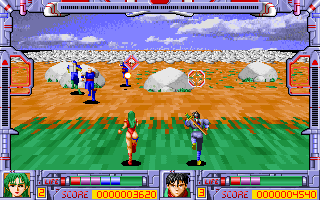
Iljimae-jeon: Manpa Sikjeon-pyeon
|
|
Produced by Danbi with support by Goldstar, this game is introduced at the Danbi profile.
|
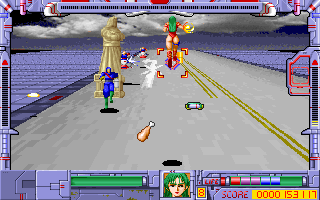
Iljimae-jeon: Manpa Sikjeon-pyeon
|
|
|
|
아기공룡 골디 (Agi Gongnyong Goldie) - PC-DOS (1994)

Agigongnyong Goldie
|
|
An edutainment / multimedia game aimed at children. The title very obviously rips off the Dooly franchise.
|

Agigongnyong Goldie
|
|
|
|
일지매전 ~만만파파식적편~ (Iljimae-jeon: Manman Papa Sikjeok-pyeon) - PC-DOS (May 1995)
|
|
돌아온 영웅 홍길동 (Doraon Yeongung Hong Gildong) - Windows (December 1995)
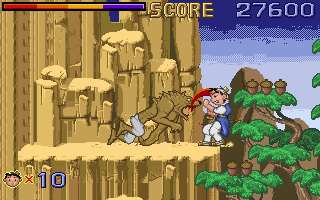
Doraon Yeongung Hong Gildong
|
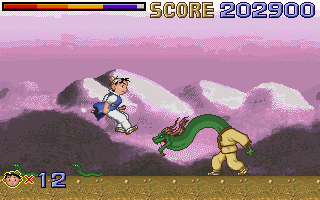
Doraon Yeongung Hong Gildong
|
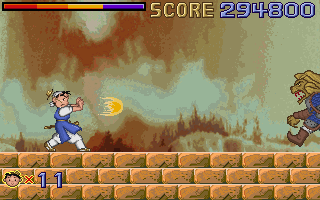
Doraon Yeongung Hong Gildong
|
|
From LG's Dolkkot Studio hails one of the many games based on Korea's flagship folk tale, or in this case rather based on the animated movie based on the tale.
Like most adaptions of animated movies for kids, Doraon Yeongung Hong Gildong is a platformer, not unlike many close-to-contemporary Disney video games (Aladdin, Lion King, etc.).
Yet the Korean game doesn't adhere to the same quality standards as those, and besides its share of bugs, the gameplay feels unpolished. When hit, Hong Gildong gets thrown back, which not only can cast him off cliffs, but also straight through walls that are otherwise impenetrable. The collission detection is so brutal that it's often almost impossible for the hero to hit enemies with his sword without getting hit himself, quickly forcing him to use up his limited supply of ranged attacks. For that reason the third boss (about halfway through the game) already is next to invincible without a huge amount of luck.
Once again flaws almost typical for Korean games in this period, obvious lack of balancing and bugfixing, spoil a product that could have turned out quite nice with just some more time and money for the development. The level design feels inspired, with short cuts and hidden pickup items aside from the straight path to the exit, and the presentation is on par with the aforementioned Disney games. Cute ingame graphics and (semi-)orientalistic tunes are supplemented with funny clips from the movie in between levels, although encoded in low quality.
|
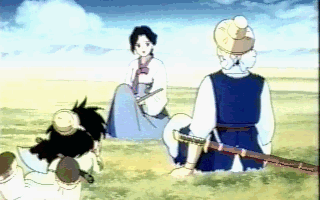
Doraon Yeongung Hong Gildong
|
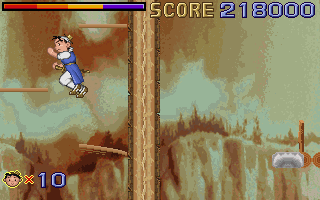
Doraon Yeongung Hong Gildong
|

Doraon Yeongung Hong Gildong
|
|
|
|
파이어월 (Firewall) / Firewall: Man vs. Machine - 3DO, PC-DOS (1996)
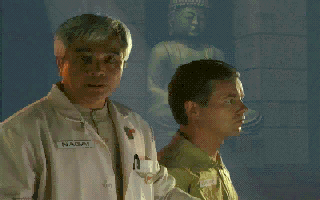
Firewall (PC)
|
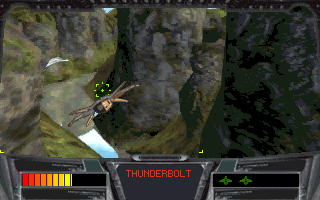
Firewall (PC)
|
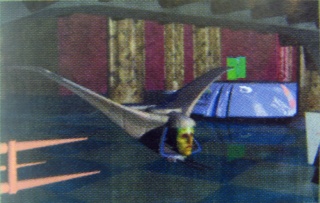
Firewall
|
|

American PC Cover
Goldstar/LG had bet on a losing horse in the console business with the 3DO, but they put up a fight like no other of the console publishers in Korea, securing deals for a number of exclusive 3DO games never sold outside of the peninsula. Firewall though was released in North America as well, if only as a PC version. No wonder, as Firewall was officially produced in cooperation with the US-based Visionary Media. Cooperation in this case apparently meant that LG's participation was mostly limited to funding and publishing, as the staff directly involved in the game was almost all-American (or at least not Korean).
The game is a FMV-based shooter like Star Wars: Rebel Assault. There are first person levels where the player is limited to shooting the enemies with a somewhat awkward aim, but also stages played in a 3rd person view with obstacles to avoid. More than half of the game takes place in "cyberspace" which makes for some way-out looking graphics, in a 1990's sense. For what it is, Firewall is a fairly competent game, but the action grows unreasonably hard fast.
One cannot help but think that the American developers didn't quite get what the Koreans wanted of them, though, what with the setting in a futuristic China and a Japanese main actor in the hilariously badly acted cutscenes. Feels like "It'll do as long as it's gonna be kinda Asian-ish".
|
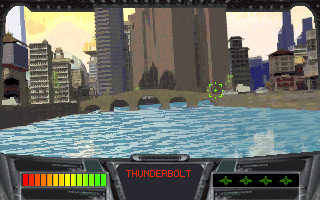
Firewall (PC)
|
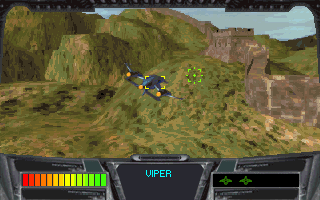
Firewall (PC)
|
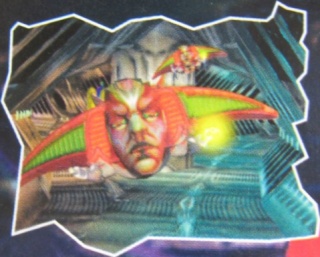
Firewall
|
|
|
|
배틀 블루스 Battle Blues - 3DO (1996)

Battle Blues
|

Battle Blues
|
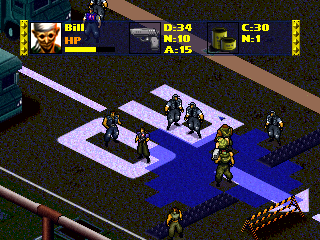
Battle Blues
|
|
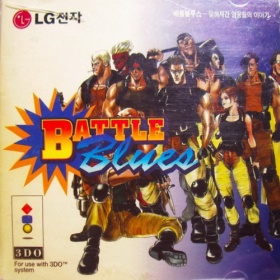
Cover
Although it was developed by an independent team called Shin's Entertainment, LG secured Battle Blues as an exclusive title for their 3DO system. The SRPG puts a strong focus on story, which is told in FMV sequences. These are hand-drawn and are quite atmospheric with their sketchy look, although the animation is very basic, often they just string together a number of stills.
While the visual design reminds of famous squad-based TBS, the gameplay is a far cry from the tactical finesse of a X-Com or Jagged Alliance. The strategic options are limited to buying and selling weapons in betweeen skirmishes, which are fought out strictly turn based. Enemies are visible from the very beginning, line-of-fire is implemented all too rudimentarily. (Humans in between shooter and target are ignored wholesale, while immobile obstacles are always treated like solid walls, no matter how small they are.) Dead allies are always revived in the next part of the mission, only when the leader bites the dust it's instant game over. Ammunition (or the lack thereof) carries over though.
In the end, there's not much one can do except trying to lure single enemies into ambushes, but even that is almost impossible. There's a high random factor to damage, and the difficulty level gets really unfair really fast.
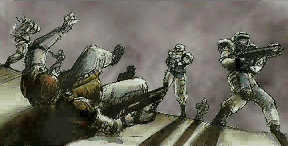
|

Battle Blues
|
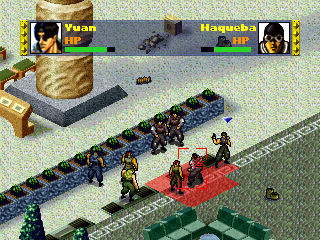
Battle Blues
|
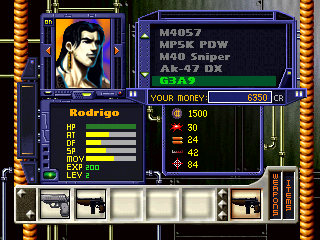
Battle Blues
|
|
|
|
아마게돈 (Armageddon) - 3DO (1996)
|
|
아기공룡 둘리 (Agi Gongnyong Dooly) / The Little Dinosaur Dooly - PC-DOS (1996)
|
|
스톤액스 / Stone Axe: Search for Elysium - Windows (1997)
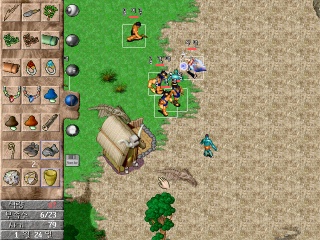
Stone Axe
|
|
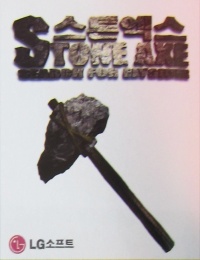
Cover
RTS game about rivaling prehistoric tribes. Inconventional elements like item and food management and a particularly cryptic interface make this challenging to play even when disregarding the language barrier.
|
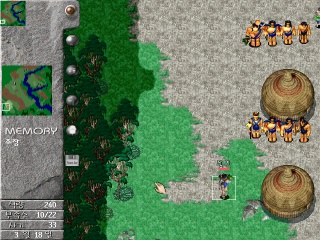
Stone Axe
|
|
|
|
Tahl: Uncover the Evil Within (탈) - Windows (June 1999)
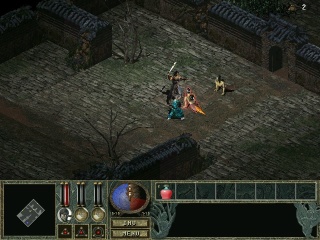
Tahl
|

Tahl
|
|
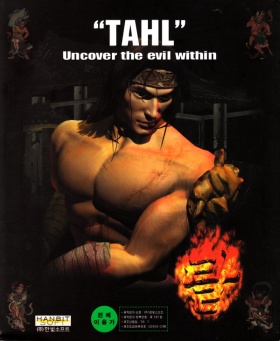
Cover
The development of Tahl started at LG, but it was published by Hanbit after the split. Like many Korean RPGs (Iljimae, Mangguk Jeon'gi) the scenario was based off the winning entry of a game writing contest contest13.
Looking at the game superficially, it looks just like a Diablo clone, although the dungeons are not generated randomly. There's also no safe hub for the player to recover and the game drops players right inmidst haunted ruins full of ghosts and zombies, making the game very difficult. A multiplayer mode is also missing, instead one gets to recruit (bad) AI controlled mercenaries.
Hanbit also announced a port for the PlayStation14 in cooperation with the Japanese company Urban Plan (who made the PSX port of the Double Dragon NeoGeo game)15, but it was never released.
|
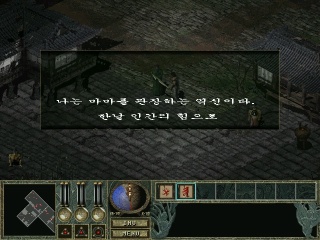
Tahl
|

Tahl
|
|
|
|
References
1. PC Power Zine 11/2000, page 212
2. Game Champ 4/1993, page 39
3. PC Champ 1/1997, page 128
4. PC Power Zine 3/1999, page 165
5. http://www.khgames.co.kr/week_11/main_content.htm?mCode=7964931101284122&sCode=9069651101284187&idx=760&code=w_column
and PC Power Zine 5/2000, page 168
6. http://www.zdnet.co.kr/news/news_view.asp?artice_id=20110314145201
7. http://www.gamemeca.com/news/news_view.html?seq=2&ymd=20000520&page=4&point_ck=&search_ym=&sort_type=&search_text=%BE%EE%BA%F1%BD%BA&send=&mission_num=&mission_seq=
8. http://www.gamejob.co.kr/List_GI/GI_Info_Read.asp?C_ID=hanbithr
9. http://www.dailygame.co.kr/news/read.php?id=22471
10. http://www.thisisgame.com/board/view.php?id=170099&category=101
11. PC World 8/1994, page 102
12. PC Champ 4/1996, page 93
13. [citation]
14. PC Power Zine 11/1999, page 164
15. http://isplus.live.joinsmsn.com/news/article/article.asp?total_id=517781&cloc=
|
A History of Korean Gaming
|
Goldstar / LG / Hanbit:
|
Page 1
|
Page 2
|
|
|
|